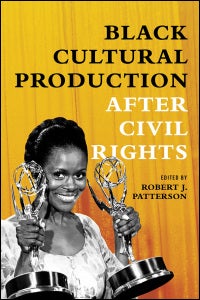Book by African American Studies Professor Selected for Prestigious Choice Reviews Award
Black Cultural Production After Civil Rights, edited by Department of African American Studies professor Robert Patterson, Ph.D., was recently selected as a Choice Reviews Outstanding Academic Title for 2020. The collection of essays, from a variety of scholars, examines the significance of the 1970s to Black studies and Black culture.
This book originally started as a volume in a larger series that examined the development of African American literature since its inception. However, Patterson decided to pull this collection of essays and more deeply examine Black cultural production in the aftermath of the 1960s, a time period he refers to as epitomizing the regression-progression paradox of Black life.

“In many instances throughout Black history, there are periods of strife that are immediately followed by periods of innovation that are then followed by strife and so on,” Patterson explains. “It’s a very ‘a few steps forward followed by a more than a few steps backwards’ type of model. But it is these periods of innovation that we find what I refer to as Political Imaginative Possibility (PIP) that is we must discuss, because it is this innovation by Black people that changed our world for the better.”
Patterson explains that is why this volume of essays focuses on the 1970s, as this decade was a watershed moment in the proliferation of Black culture. The professor says that from this period and others like it, Black artists not only respond to the now, but look to the future.
“I use the phrase PIP to describe how black cultural production has responded to this era because in addition to the legal recourse that black life, politics and culture had to negotiate, Black cultural production simultaneously imagined what life could be,” he explains. “This is important because it is in those imaginings where we see the most innovative ideas to better society and it is where we see the most exciting and creative reframing of social norms.”
In order to holistically address Black cultural production during the 1970s in this text, Patterson incorporated research by both senior and junior scholars to speak to the various aspects of expansion that happened during this period. Each chapter is written by a different contributor who each addresses one another’s research throughout their essays, which creates an ongoing conversation throughout.
Though the 1970s was a pivotal time for Black culture, other times in history have led to similar evolutions including the present day.
“After the 2016 election, you see a blossoming of artistic expression,” says Patterson. “The Oprah Winfrey Network greatly expanded through the work of Ava DuVernay and Queen Sugar for example. These shows were expansive representations of Black people attempting to underscore our consistent range of humanity, brilliance and ingenuity and that there are more representational opportunities available to overcome.”
Representation is still a battle being fought. The cover of Black Cultural Production After Civil Rights shows the iconic photo of Cicely Tyson holding her two Emmy awards, which Patterson says he thought was emblematic of Black cultural production after the legislative achievements of the mid-twentieth century Civil Rights movement. The day that it was announced that the book was chosen for the Outstanding Academic Title for 2020 was the same day that Tyson passed away.
Patterson says the arts are still and will always be a place that “allows for the imagination to set the bar by which people measure themselves, by which they think of who they can aspire to be.”
“Part of what art does is it reflects and gives nuance to those reflections,” says Patterson. “It opens up possibilities that sometimes don’t seem feasible and can change the world. For Black people in particular, the arts have been a space to claim access to different elements of democracy from which the law, public policy and interpersonal practice have excluded or marginalized.”
-by Shelby Roller (G’19)
